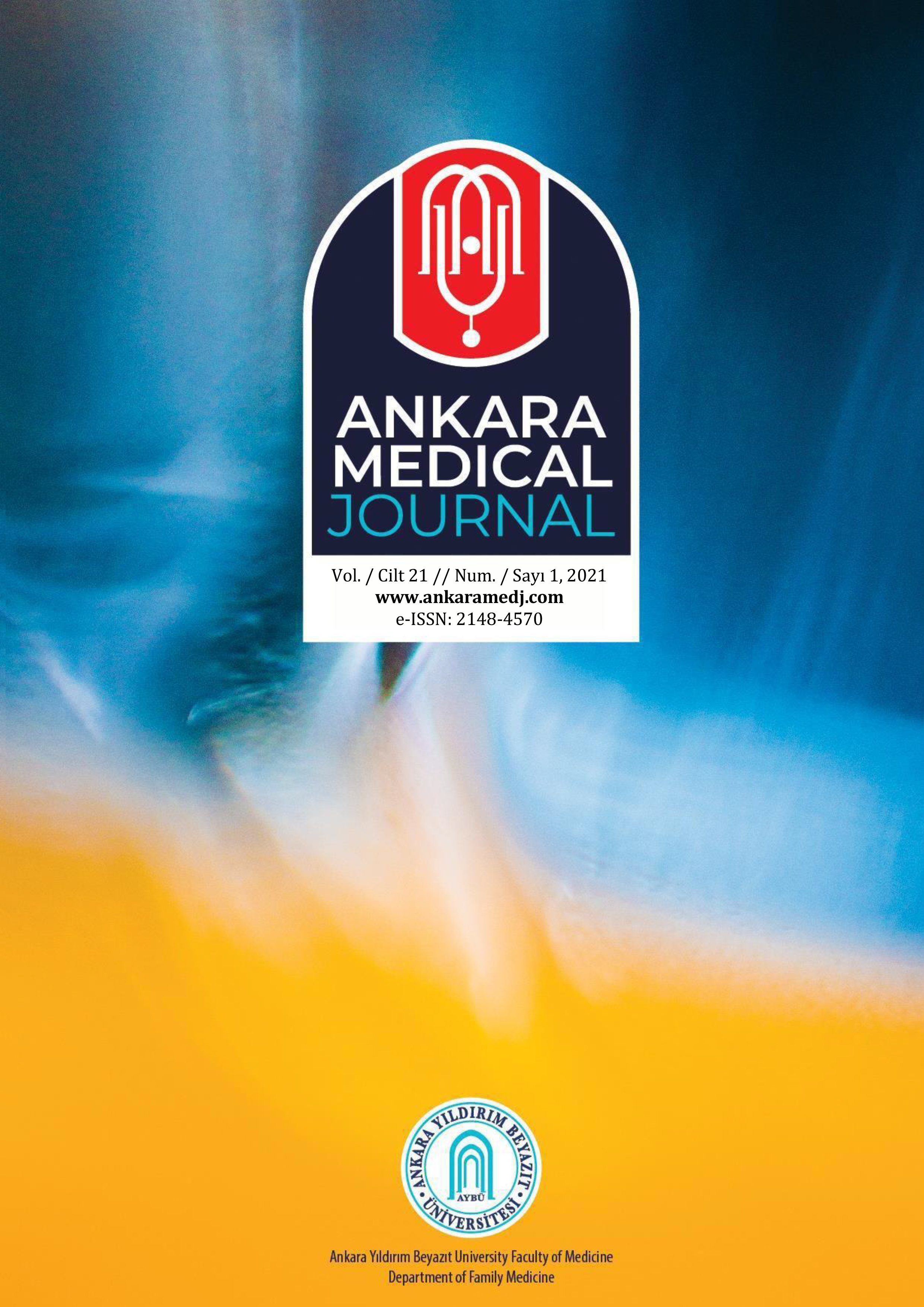Gebelikte Üriner İnkontinansın Yorgunluk Düzeyi ve Uyku Kalitesi ile İlişkisinin İncelenmesi
Hacer Alan Dikmen1, Hamide Yıldırım2, Kamile Marakoğlu31Selçuk Üniversitesi Sağlık Bilimleri Fakültesi, Ebelik Ana Bilim Dalı, Konya.2Selçuk Üniversitesi Sağlık Bilimleri Enstitüsü, Ebelik Ana Bilim Dalı, Konya.
3Selçuk Üniversitesi Tıp Fakültesi, Aile Hekimliği Ana Bilim Dalı, Konya.
GİRİŞ ve AMAÇ: Bu çalışmanın amacı, gebelikte yaşanan üriner inkontinans ile yorgunluk düzeyi ve uyku kalitesi arasındaki ilişkiyi incelenmektir.
YÖNTEM ve GEREÇLER: Tanımlayıcı ve kesitsel türde yapılan çalışmanın verileri, Ocak-Mart 2020 tarihleri arasında, bir kadın doğum hastanesinin gebe polikliniğine başvuran 311 gebeden (okur-yazar, 18-49 yaş aralığında, tek fetüse sahip, iletişim kurulabilen, infertilite tedavisi sonucu gebe olmayan, idrar yolu enfeksiyonu ve herhangi bir kronik hastalığı olmayan), kişisel bilgi formu, İnkontinans Şiddet İndeksi (İŞİ), Pittsburgh Uyku Kalitesi İndeksi (PUKİ) ve Yorgunluk Şiddeti Ölçeği (YŞÖ) ile toplanmıştır.
BULGULAR: Çalışmamızda gebelerin yaş ortalaması 27,25±5,641, gebelik haftası ortalaması 29,46±9,581di. Gebelerin %61,10unda (190) üriner inkontinans şikayeti vardı, %68,80inin (214) uyku kalitesi kötüydü. Gebelerin %46,60ı (145) yorgundu. Çalışmamızda gebelerin İŞİ ve PUKİ puan ortalaması arasında istatistiksel olarak anlamlı, pozitif yönde ve düşük düzeyde (r= 0,209; p<0,001) ilişki saptanırken, YŞÖ ile istatistiksel olarak anlamlı bir ilişki saptanmadı (p=0,184).
TARTIŞMA ve SONUÇ: Çalışmamızda gebelerin üriner inkontinans düzeyi arttıkça kötü uyku kalitesi artmaktaydı. Gebelerin üriner inkontinans düzeyi ile yorgunluk düzeyleri arasında ise bir ilişki yoktu. Sağlık profesyonelleri antenatal izlemlerde, gebelerin üriner inkontinans, uyku ve yorgunluk düzeylerini mutlaka değerlendirmeli ve inkontinans varlığı saptanan gebelerde baş etme ve tedavi noktasında gerekli bakım uygulamaları önerilmelidir.
An Investigation of the Relationship of Urinary Incontinence and Fatigue Level and Sleep Quality in Pregnancy
Hacer Alan Dikmen1, Hamide Yıldırım2, Kamile Marakoğlu31Department of Midwifery, Selcuk University, Konya, Turkey2Institude of Health Sciences, Selcuk University, Konya, Turkey
3Department of Family Medicine, Selcuk University, Konya, Turkey.
INTRODUCTION: This study aimed to investigate the relationship between urinary incontinence and fatigue level and sleep quality during pregnancy.
METHODS: This descriptive and cross-sectional study was conducted in 311 pregnant women (literate, in an age range of 18-49 years, singleton pregnant, able to communicate, did not get pregnant as a result of infertility treatment, without a urinary tract infection or a chronic disease) who were presented to the pregnant polyclinic of a maternity hospital between January and March 2020. The data were collected using a personal information form, Incontinence Severity Index (ISI), Pittsburgh Sleep Quality Index (PSQI), and Fatigue Severity Scale (FSS).
RESULTS: In our study, the mean age of the participants was 27.25±5.641 years, and the mean gestational week was 29.46±9.581. 61.10% of the pregnant women (190) had urinary incontinence; sleep quality of them was bad in 68.80% (214). 46.60% (145) of the pregnant women were "fatigued". In our study, there was a significant positive and low-level correlation between the ISI and the PSQI mean scores (r=0.209; p <0.001); no significant correlation was found between ISI and the YSS (p=0.184).
DISCUSSION AND CONCLUSION: In our study, as the urinary incontinence level increased, poor sleep quality increased. There was no relationship between urinary incontinence and fatigue levels in pregnant women. During antenatal, health care professionals should evaluate the urinary incontinence, sleep quality, and fatigue levels of pregnant women, and require care practices should be offered involving coping strategies and treatment modalities in pregnant women with incontinence.
Makale Dili: İngilizce
(1083 kere indirildi)





